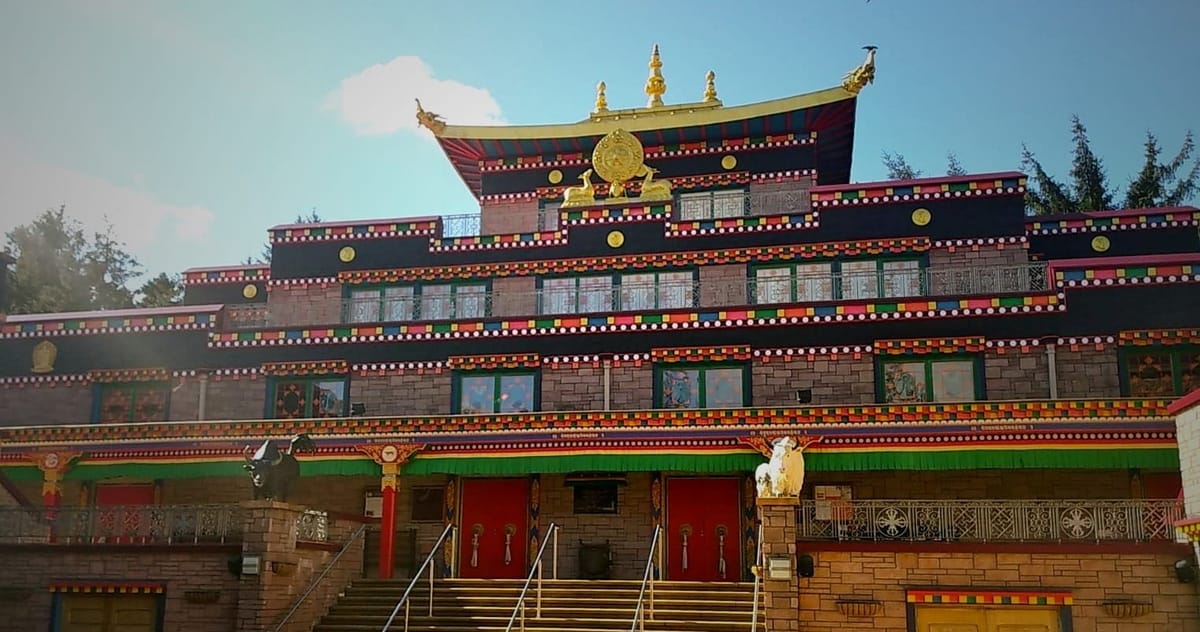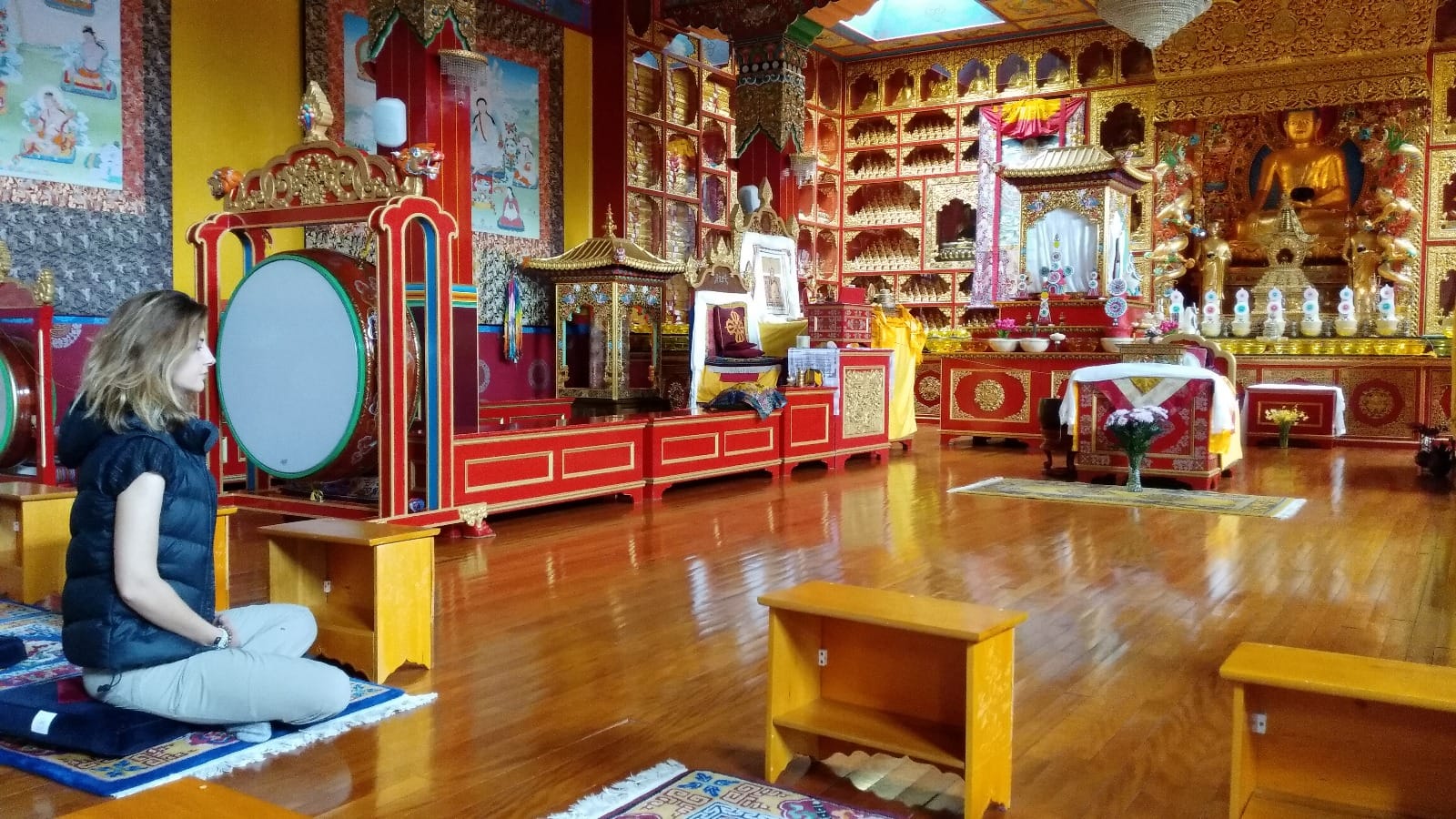In a Monastery I Didn’t Want to Visit
In a cold shrine room at 5am, with incense in the air and a monk beside me, I accidentally stumbled into presence. I didn't walk out of that room transformed. But something shifted. A fracture in the old way of being. A breath. A question.

This is a personal story—not about answers or dramatic breakthroughs, but about unexpected turning points that begin quietly, often in moments of resistance and silence, gently reshaping who we are.
I’ve always felt like an outsider—at school, with friends, in conversations. Like I kept walking into scenes halfway through the script, missing the cues, the lines, the rhythm.
I was born in Turkey and have lived across London, Berlin, Los Angeles, Lisbon—from China to Mexico, that feeling of ‘internal foreignness’ followed me. Like Meursault in Camus’ The Stranger, I moved through the world without quite belonging—anywhere.
At some point, I stopped assuming it was the country, the weather, the people. I started wondering if it was something deeper—something inside me.
The 2008 financial crash gave me space to investigate that feeling. I began reading about mental health—not because I wanted a diagnosis, but because I wanted to understand where that sense of alienness was coming from. That path eventually led me to publish a book, which led to a scholarship to study an MSc in Cognitive Sciences at University College London.
And a week before my degree started, a friend of mine called.
“Want to visit a Buddhist monastery in Scotland?”
“Absolutely not,” I said—I had zero interest in spirituality.
But he kept nagging about the nature in Scotland, the air, the silence. I said yes, thinking it would be a quiet weekend at worst, not expecting much more than a couple of days of damp air and forced introspection.
What I stumbled into didn’t feel life-changing at the time—but looking back, it marked the beginning of something I couldn’t name yet.
The monastery was called Samye Ling, near Lockerbie. When I arrived, someone at reception asked if I was there to meet the abbot for an interview. Interview? For what?
“You can ask him any question,” he said.
That sentence landed strangely in me. It sounded like a dare, so I took it.
The next morning, I was in a tiny waiting room with three strangers—wondering if they were feeling as out of place as I was. No one spoke.
Eventually the abbot arrived. A cheerful monk in burgundy robes called Lama Yeshe Rinpoche.
At the time, I didn’t know he’d become one of the most influential people in my life—quietly steering it onto an entirely different track by eventually sending me to India, where I would return every April for seven years to study.
He greeted us and invited us in, one by one. I was last. The wait felt like 300 years.
When it was finally my turn, I walked in. There was a window and two armchairs. He gestured for me to sit and asked, “How can I help?”
I’m not entirely sure I answered at all. My mouth moved but it’s possible I just blinked awkwardly and hoped for the best. He began to ask some simple questions—where I was from, how long I’d been in the UK. The kind of small talk that's meant to make you feel at ease. But I could barely answer. Because beneath the simple questions was a vast presence. It wasn’t intimidating, but it was like being really seen—not judged or analyzed, just met.
At some point, he finished talking so I stood up and left. But I couldn’t walk. I ran. Hiking boots and all, I bolted along the pebbled river path next to the monastery, energy surging through my system in a way I’d never experienced before. I didn’t know what had happened. But something had.
All I knew was that something cracked open—and it wasn’t going to close back the same way.

That wasn't the only thing that caught me off guard. In that same monastery, I also reluctantly learned how to meditate.
One afternoon, while I was flipping through books in the library and sipping my tea, a monk asked if I wanted to try meditating. I said, 'Alright'—more out of politeness than conviction. He just smiled and said, 'Great. Come to the small shrine room at 5am tomorrow.'
5am? He must've meant 5pm for sure.
I showed up anyway. The sky was still dark. The room smelled like incense and some sort of enlightenment that my spirit wasn't ready for yet. There were three large golden statues at the front, and some low cushions beside the monk, who was already seated. He pointed for me to sit next to him.
“For twenty minutes,” he said, “look at the floor. I’ll ring the bell once to start, three times to end. Just follow your breath.”
He rang the bell.
I fixed my eyes at a spot on the floor and followed my breath. A few minutes in, something shifted. It felt like I’d taken an elevator to the top of a skyscraper. From that high floor, I could look down at the streets of my mind. There were busy intersections. Gridlocks. Quiet alleys. Some parts chaotic, others eerily still.
But I wasn’t lost in it anymore. I was just watching—staring at the code that ran my mind, that ran my life.
Then the bell rang.
I turned to the monk. “Why did you ring the bell?”
“That was twenty minutes,” he said.
It had felt like twenty seconds. I asked if we could do another round. He said okay, and rang the bell again.
Back to the breath. Back to the elevator. Back to that wide-angle view of how I function. When the bell rang again, I was almost frustrated. I asked if we could go one more time.
He said he had to leave for prayers, but I could continue on my own. He handed me the bell, the small mallet, and a desk clock. I set the timer for 20 minutes and sat again—naively resetting it each time, without considering that I could just meditate as long as I wanted.
Just to clarify: I wasn't searching for answers, breakthroughs, or enlightenment. I wasn't trying to fix myself or even understand myself better. Yet in those silent minutes, something quietly reorganized inside me. I just sat there, watching random things appearing in my mind. Tons of thoughts, truckloads of emotions, a bunch of random bodily sensations. I felt like one of those fridge-cleanout soups—whatever was in me, got thrown in. And somehow, I was keen to make sense of it. Or at least season it properly.
So there I was: an agnostic with zero interest in meditation, mindfulness, or spirituality, getting hooked! I’d thought meditation would be mildly relaxing at its best, and most likely severely boring and highly irrelevant. And I got to experience a structural shift in consciousness at my first trial. Nothing could stop me after that… or so I thought at the time.
I didn’t walk out of that shrine room a new person. But I did walk out knowing something was about to change. Not overnight. Not obviously.
That morning wasn’t the end of anything. It was the beginning.
There were no fireworks. Just a crack. A glimpse.
What I didn’t know back then was that this is how a journey might begin—not with fireworks, but with a simple breath. Not with answers, but with a lot of questions.
If you’re still waiting for a turning point in your life, remember that some of the most important shifts may come quietly.
They don’t shout. But they quietly reshape everything that follows—if you're willing to notice.
Have you experienced a quiet turning point that reshaped your life unexpectedly? I'd love to hear about it.